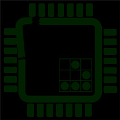BIOS was designed in the era of the initial IBM PC, running IBM PC-DOS — when DOS meant Disk Operating System not Denial of Service — back when there was no security in any hardware, firmware, or software designs. 🙂 As UEFI documentation likes to mention, BIOS has no security, unlike UEFI (well, at least v2, EFI v1 had much less security). But SeaBIOS, the open source BIOS implementation, has had TPMv1 support for BIOS (and ACPI) since 2011, and today it just got TPMv2 support! It appears that initial TPMv1 support was added to SeaBIOS in 2011 by Stefan Berger of IBM, including TPM support for ACPI; excerpt from his patch email:
The following set of patches add TPM and Trusted Computing support to SeaBIOS. In particular the patches add:
– a TPM driver for the Qemu’s TPM TIS emulation (not yet in Qemu git)
– ACPI support for the TPM device (SSDT table)
– ACPI support for measurement logging (TCPA table)
– Support for initialzation of the TPM
– Support for the TCG BIOS extensions (1ah handler [ah = 0xbb]) (used by trusted grub; http://trousers.sourceforge.net/grub.html)
– Static Root of Trusted for Measurement (SRTM) support
– Support for S3 resume (sends command to TPM upon resume)
– TPM-specific menu for controlling aspects of the TPM
– [An optional test suite for the TIS interface]
All implementations necessarily follow specifications.
When all patches are applied the following services are available
– SSDT ACPI table for TPM support
– initialization of the TPM upon VM start and S3 resume
– Static root of trust for measurements (SRTM) that measures (some) data of SeaBIOS in TCPA ACPI table
– 1ah interrupt handler offering APIs for measuring and sending commands to the TPM (trusted grub uses them)
– User menu for controlling aspects of the state of the TPM
Full message:
http://www.seabios.org/pipermail/seabios/2011-April/001609.html
https://lists.gnu.org/archive/html/qemu-devel/2011-08/msg03835.html
Steven has an article on the QEMU wiki on SeaBIOS TPMv1 support. And Stephan has a SeaBIOS-TPM project on Github, I’m unclear how this relates to SeaBIOS source tree:
http://wiki.qemu.org/Features/TPM
https://github.com/stefanberger/seabios-tpm
So, that was the old 2011 TPMv1 news, that I am catching up to…. Today, Stephan has a new TPM2 patch for SeaBIOS, excerpt of announcement:
This series of patches adds TPM 2 support to SeaBIOS in the way previously proposed. TPM 2 support also changes the log entry format, which I have not addressed at all so far, and would append to the end of the series.
tpm: Extend TPM TIS with TPM 2 support.
tpm: Factor out tpm_extend
tpm: Prepare code for TPM 2 functions
tpm: Implement tpm2_startup and tpm2_s3_resume
tpm: Implement tpm2_set_timeouts
tpm: Implement tpm2_prepboot
tpm: Implement tpm2_extend
tpm: Implement tpm2_menu
tpm: Implement TPM 2’s set_failure
Full message:
http://www.seabios.org/mailman/listinfo/seabios
Also search the recent checkins for other interesting TPM checkins, eg, Physical Presence API, etc.
I asked on the SeaBIOS list if there was a security roadmap for me to point to, and what consumer devices have TPM support; Kevin O’Connor replied, mentioning the addition of TPMv2, and:
I’m not aware of any new consumer devices shipping with the support, and I understand that KVM/QEMU have had TPM support for some time already.
I think some Google Chromebooks come with coreboot-based TPM-enabled SeaBIOS, and TPM is used to store developer mode state instead of CMOS. I haven’t found canon spec in ChromeOS site, but there are a few online references such as this:
https://news.ycombinator.com/item?id=9185719
I’m not aware of any new consumer devices shipping with the support. If you have a new system, check with the vendor to see if it supports TPM or not. If your BIOS is not SeaBIOS-based, check if it has TPM support; if not, ask the vendor why not.
It would be interesting for a security researcher to compare the BIOS security measures in currently-available consumer devices, SeaBIOS-based and other BIOS codebases. I am not sure how many different BIOS codebases there are, these days. Perhaps AMI and Phoenix have one, and some OEMs? I should research that more. Ralph Brown: help! 🙂

Dear Stephan:
I recently read a whitepaper about Virtual TPMs which had your name on it as one of the authors:
Click to access 325dfe5eae1f15e0596b3e6e7fae9954f151.pdf
I was doing research on TPMs, trying to write a more user-friendly walkthrough guide on StackExchange, which (I hope) helps people to leverage their TPM to store private keys in a virtual smart card, giving them an alternative to the cost and inconvenience of HSMs and smartcards:
https://security.stackexchange.com/a/179422/68088
I mentioned your whitepaper at the end of my walkthrough guide above. Can you please take a look at my walkthrough, and provide feedback in the comments in case you think there is anything I may have misstated or omitted?
Sincerely,
Jason McNeill
LikeLiked by 1 person